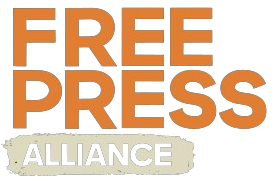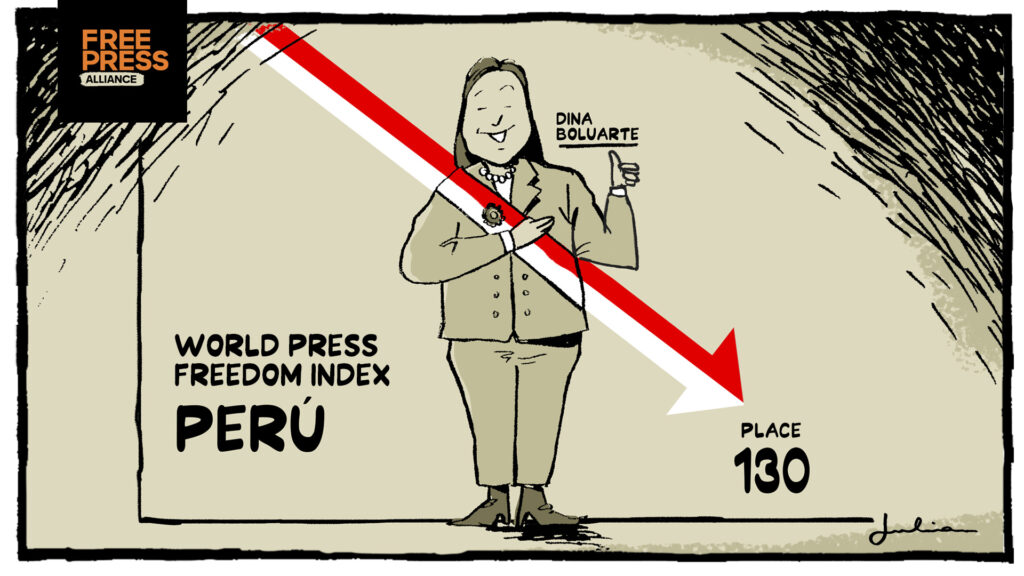Following the release of Reporters Without Borders’ (RSF) Press Freedom Index, the outlook for Peru is deeply concerning. The country has dropped 53 positions over the last three years, currently ranking 130 out of 180 nations. This sharp decline reflects an increasingly hostile environment for journalists and media outlets, marked by harassment, violence, and repressive legislative initiatives. Below, we examine the key factors driving this deterioration.
A fragmented and pressured media ecosystem
Outlets such as Trome, the country’s most-read newspaper, and Radioprogramas del Perú, the leading news radio station, still maintain broad reach. However, widespread public distrust has led audiences, particularly younger ones, to turn to alternative sources like TikTok for news. This digital migration has caused a sharp decline in viewership for traditional TV channels.
Political and institutional crisis: The start of the downfall
On December 7, 2022, then President Pedro Castillo attempted to dissolve Congress and establish an emergency government. The move was swiftly blocked, and Dina Boluarte assumed the presidency with the backing of ultraconservative factions in Congress.
Since then, Congress has seized control of key institutions, including the Constitutional Court, weakening the separation of powers. The state’s brutal repression of protests, which resulted in 48 deaths between December 2022 and March 2023, marked a turning point toward authoritarianism.
Ley Mordaza: A direct threat to journalism
On March 13, 2025, the Peruvian Congress passed the first vote on a controversial legal reform known as the “Ley Mordaza” The initiative increases prison sentences for defamation to up to five years and introduces vaguely defined crimes such as “violation of personal privacy,” posing a direct threat to investigative journalism.
The bill also shortens the mandatory response time for corrections from seven days to just 24 hours, encouraging self-censorship. A second vote for final approval is expected in the coming weeks.
Clampdown on independent media: New law on international cooperation
On April 14, 2025, President Boluarte enacted a law expanding government control over civil society organizations, including media outlets funded through international cooperation. The reform requires prior government approval for foreign-funded projects, allows for arbitrary sanctions, and prohibits support for actions deemed “against the Peruvian state”, terms left deliberately vague.
The Inter-American Commission on Human Rights has voiced concern over the law’s restrictive effects on press freedom and independent journalism.
Escalating violence: Journalists murdered with impunity
The year 2025 has seen a deadly resurgence in violence against journalists in Peru. In January, Gastón Medina, founder of Cadena Sur TV, was shot dead outside his home. Medina had received threats since 2022, yet authorities failed to provide him with adequate protection.
On May 7, Raúl Celis López, a 70-year-old journalist known for exposing police corruption and organized crime, was murdered in Iquitos by gunmen who shot him in the head while he was going to his radio station.
In response, RSF issued a strong statement:
“Journalists reporting on the social, political, and environmental realities of the Amazon are unprotected. Their work is essential to documenting human rights violations in regions abandoned by the state. Peru must urgently ensure their safety and freedom to report.”— Artur Romeu, RSF Latin America Director
Persecution from power: The IDL-Reporteros case
The climate of intimidation is further evidenced by remarks from President Boluarte, who recently suggested raiding the offices of IDL-Reporteros and investigating its director, acclaimed journalist Gustavo Gorriti, a nominee for RSF’s 2024 Courage Prize. These verbal attacks from the highest levels of government deepen the already fragile situation for journalism in the country.
At Free Press Alliance, we strongly condemn the murders of journalists in Peru and call for swift, independent, and transparent investigations. We urge Peruvian authorities to protect those who exercise the right to report and call on journalists and media organizations to resist self-censorship. To protect journalism is to protect democracy.

